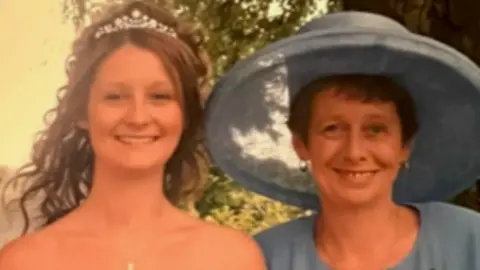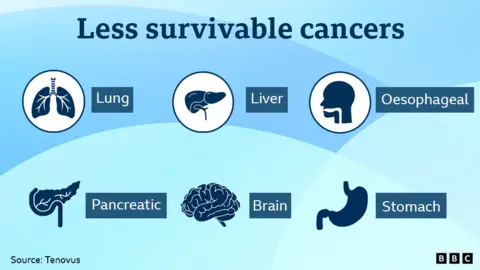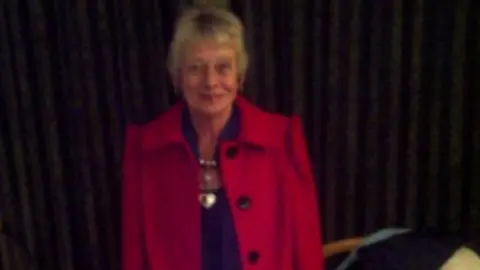Less survivable cancers: Bereaved daughter urges vigilance
 Family photo
Family photoA woman whose mother died of pancreatic cancer says more needs to be done urgently to raise awareness of symptoms of low-survival-rate cancers.
Gwen Booth died in 2015 of pancreatic cancer aged 66, just two weeks after being diagnosed.
Her daughter said that although her mother had been unwell, the diagnosis was "completely shocking".
"I didn't even know what pancreatic cancer was at that time," said Kelly Williams from Sarn, Gwynedd.
"You look back at all the symptoms now and it's there," the 42-year-old said. "It's in the pancreatic cancer leaflet. If only we'd known about it, maybe it would have helped."
She said people needed to be more aware of those symptoms, and has been raising funds for Pancreatic Cancer Action.

Lung, liver, brain, stomach, pancreatic and oesophageal cancer account for about half of all cancer deaths.
But only 1% of respondents in Wales could identify all the symptoms of oesophageal cancer in a survey by the Less Survivable Cancers Taskforce (LSCT).
Around 2% knew the symptoms of liver cancer, 4% recognised stomach cancer symptoms and 9% of respondents knew all the symptoms of lung cancer.
Symptom awareness of those cancers is "shockingly" low, the head of Tenovus Cancer Care said.
 Family photo
Family photo"The difference between being diagnosed early with lung cancer and being diagnosed late has a significant impact in terms of treatment options that are possible," said Judi Rhys, chief executive of Tenovus Cancer Care, one of the charities supporting the Less Survivable Cancers Taskforce.
"We urgently need to improve the shockingly low symptom awareness of the six less survivable cancers, but we also need to address the need for more screening programmes and preventative work."
More people in Wales die from lung cancer than any other cancer.
Tenovus successfully campaigned for the introduction of a lung cancer screening project in Wales which will begin this year.
It has also called for the Welsh government to do more to improve survival rates.
"We want to see the cancer plan enacted so that we can have far more people having access to early diagnosis for these less survivable cancers," said Ms Rhys.
"We need more staff, we need more early diagnostic hubs and we just need the treatment pathways to be speeded up so that we can get people diagnosed early, treated and save hundreds of live."
Ms Williams said her mother had been ill for months, with some symptoms she now recognises such as indigestion and nausea.
A&E diagnosis
Gwen's health deteriorated and she returned to the doctor several times. She was taking tablets to treat her indigestion but there was no improvement, and she became increasingly tired.
"It wasn't until the April she got a scan," said Ms Williams. "By that time she was really ill. Everything was going through her, she was vomiting.
"She was so poorly one night that we just begged her, 'please will you just go to A&E'. She was told by a junior doctor in A&E that she had pancreatic cancer.
"Looking back they should have investigated, because it was just going on and on. It wasn't clearing up."
The Less Survivable Cancers Taskforce says close to a third of people in Wales have a friend or loved one who has delayed seeking medical advice when experiencing symptoms of a less survivable cancer.
Of those, 66% were told by medical professionals that this delay had an impact on their treatment options.
Builder Dai Davies, 62, from Narberth, Pembrokeshire, was planning his retirement when he was diagnosed with stage 4 lung cancer.
"I'd started experiencing a short, annoying cough, tightness of the chest and chest pains from the centre, which extended to the left lung area. This went on for months. Then, I caught Covid-19 and thought my symptoms were down to that.
"When I finally went to the GP, she thought I had a chest infection and prescribed antibiotics. The antibiotics did nothing, and I was then sent for a chest X-ray and blood test. A large tumour was found on my left lung, and the cancer had also spread to my lymph nodes."
'Check your symptoms'
Mr Davies added: "Unfortunately, my body is not responding well to treatment but I'm staying positive and hopeful - I just wish I'd checked out my symptoms earlier, and would urge anyone else to before it's too late."
Typical symptoms will vary but red flags for less survivable cancers could include any of the following: indigestion, abdominal pain, unexplained weight loss, a loss of appetite, difficulty swallowing, a persistent cough, unexplained tiredness, headaches or nausea.
"Diagnosing cancers that affect the GI tract, such as oesophageal, stomach, liver and pancreatic cancers, can be difficult because they present either with very vague symptoms or with none at all," said Dr Dai Samuel, consultant hepatologist and clinical lead for gastroenterology at the Royal Glamorgan Hospital, Rhondda Cynon Taf.
"We need to improve our screening strategies for patients at risk of these cancers, but also ensure that those with early symptoms have timely access to diagnostic services to ensure they get the best change of cure or good treatment outcomes.
"We need to change the public fear of cancer and reinforce that our treatments are becoming more effective day by day."
In response, the Welsh government said: "We have set out a comprehensive approach to improving cancer outcomes, including important commitments to detect cancer at earlier stages, recover from the impact of the pandemic and meet the suspected cancer pathway waiting time.
"Health boards and trusts will plan and deliver cancer services in response to these commitments."
